2018年最新牛津译林版小升初英语精品复习资料
- 格式:doc
- 大小:39.00 KB
- 文档页数:6
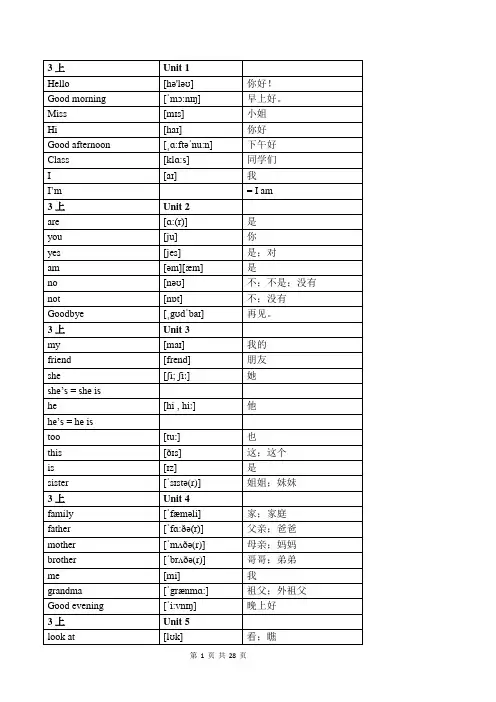
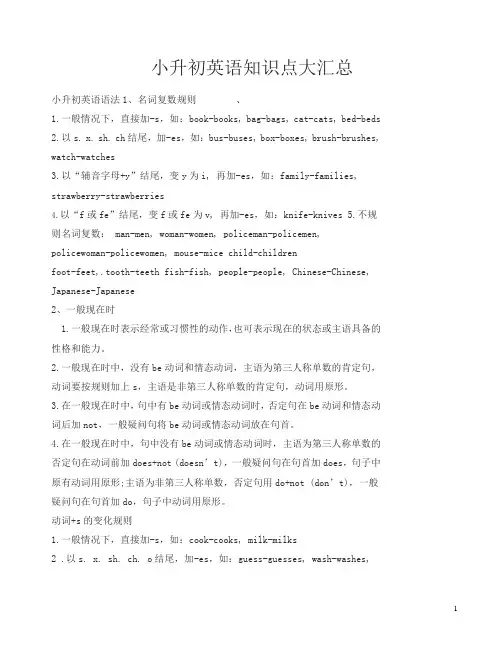
小升初英语知识点大汇总小升初英语语法1、名词复数规则、1.一般情况下,直接加-s,如:book-books, bag-bags, cat-cats, bed-beds2.以s. x. sh. ch结尾,加-es,如:bus-buses, box-boxes, brush-brushes, watch-watches3.以“辅音字母+y”结尾,变y为i, 再加-es,如:family-families, strawberry-strawberries4.以“f或fe”结尾,变f或fe为v, 再加-es,如:knife-knives5.不规则名词复数: man-men, woman-women, policeman-policemen, policewoman-policewomen, mouse-mice child-childrenfoot-feet,.tooth-teeth fish-fish, people-people, Chinese-Chinese, Japanese-Japanese2、一般现在时1.一般现在时表示经常或习惯性的动作,也可表示现在的状态或主语具备的性格和能力。
2.一般现在时中,没有be动词和情态动词,主语为第三人称单数的肯定句,动词要按规则加上s,主语是非第三人称单数的肯定句,动词用原形。
3.在一般现在时中,句中有be动词或情态动词时,否定句在be动词和情态动词后加not,一般疑问句将be动词或情态动词放在句首。
4.在一般现在时中,句中没有be动词或情态动词时,主语为第三人称单数的否定句在动词前加does+not (doesn’t),一般疑问句在句首加does,句子中原有动词用原形;主语为非第三人称单数,否定句用do+not (don’t),一般疑问句在句首加do,句子中动词用原形。
动词+s的变化规则1.一般情况下,直接加-s,如:cook-cooks, milk-milks2 .以s. x. sh. ch. o结尾,加-es,如:guess-guesses, wash-washes,watch-watches, go-goes3.以“辅音字母+y”结尾,变y为i, 再加-es,如:study-studies3、现在进行时1.现在进行时表示现在正在进行或发生的动作,也可表示当前一段时间内的活动或现阶段正在进行的动作。
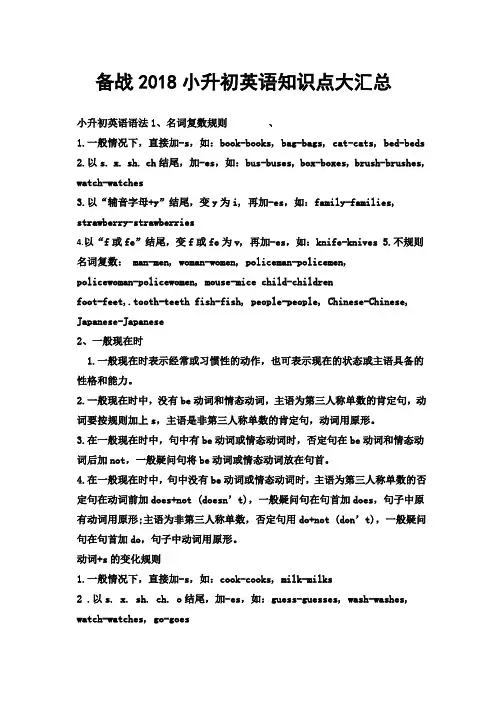
备战2018小升初英语知识点大汇总小升初英语语法1、名词复数规则、1.一般情况下,直接加-s,如:book-books, bag-bags, cat-cats, bed-beds2.以s. x. sh. ch结尾,加-es,如:bus-buses, box-boxes, brush-brushes, watch-watches3.以“辅音字母+y”结尾,变y为i, 再加-es,如:family-families, strawberry-strawberries4.以“f或fe”结尾,变f或fe为v, 再加-es,如:knife-knives5.不规则名词复数: man-men, woman-women, policeman-policemen,policewoman-policewomen, mouse-mice child-childrenfoot-feet,.tooth-teeth fish-fish, people-people, Chinese-Chinese, Japanese-Japanese2、一般现在时1.一般现在时表示经常或习惯性的动作,也可表示现在的状态或主语具备的性格和能力。
2.一般现在时中,没有be动词和情态动词,主语为第三人称单数的肯定句,动词要按规则加上s,主语是非第三人称单数的肯定句,动词用原形。
3.在一般现在时中,句中有be动词或情态动词时,否定句在be动词和情态动词后加not,一般疑问句将be动词或情态动词放在句首。
4.在一般现在时中,句中没有be动词或情态动词时,主语为第三人称单数的否定句在动词前加does+not (doesn’t),一般疑问句在句首加does,句子中原有动词用原形;主语为非第三人称单数,否定句用do+not (don’t),一般疑问句在句首加do,句子中动词用原形。
动词+s的变化规则1.一般情况下,直接加-s,如:cook-cooks, milk-milks2 .以s. x. sh. ch. o结尾,加-es,如:guess-guesses, wash-washes, watch-watches, go-goes3.以“辅音字母+y”结尾,变y为i, 再加-es,如:study-studies3、现在进行时1.现在进行时表示现在正在进行或发生的动作,也可表示当前一段时间内的活动或现阶段正在进行的动作。
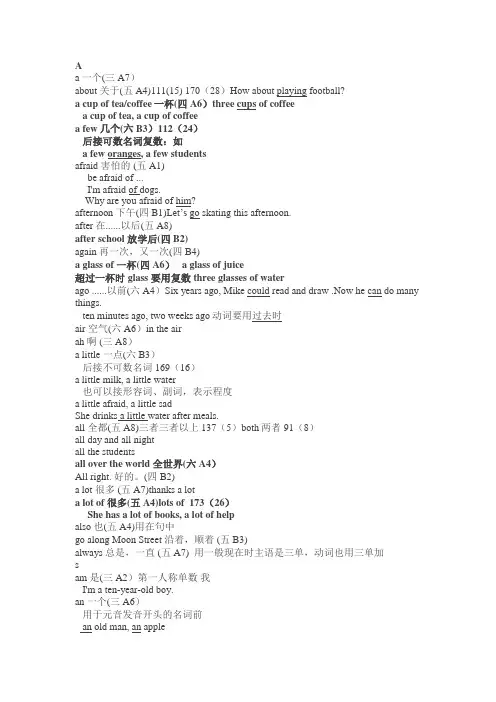
Aa 一个(三A7)about 关于(五A4)111(15) 170(28)How about playing football?a cup of tea/coffee一杯(四A6)three cups of coffeea cup of tea, a cup of coffeea few 几个(六B3)112(24)后接可数名词复数:如a few oranges, a few studentsafraid 害怕的 (五A1)be afraid of ...I'm afraid of dogs.Why are you afraid of him?afternoon 下午(四B1)Let’s go skating this afternoon.after 在......以后(五A8)after school 放学后(四B2)again 再一次,又一次(四B4)a glass of 一杯(四A6) a glass of juice超过一杯时 glass 要用复数three glasses of waterago ......以前(六A4)Six years ago, Mike could read and draw .Now he can do many things.ten minutes ago, two weeks ago动词要用过去时air 空气(六A6)in the airah 啊 (三A8)a little 一点(六B3)后接不可数名词169(16)a little milk, a little water也可以接形容词、副词,表示程度a little afraid, a little sadShe drinks a little water after meals.all 全都(五A8)三者三者以上137(5)both两者 91(8)all day and all nightall the studentsall over the world 全世界(六A4)All right. 好的。
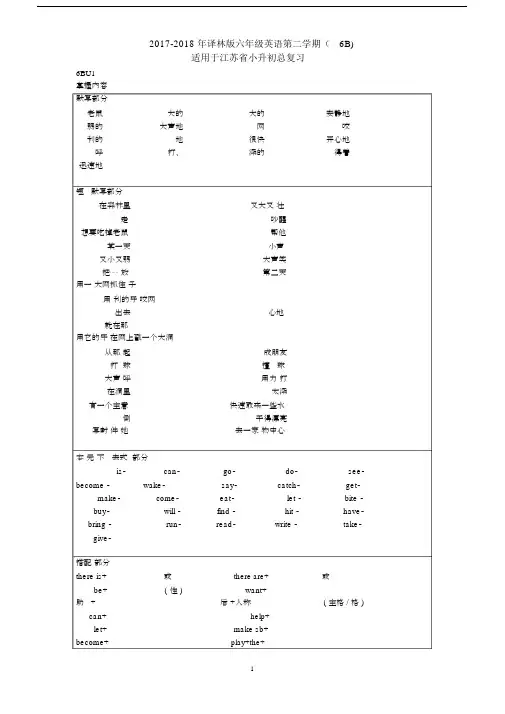
适用于江苏省小升初总复习6BU1掌握内容默写部分老鼠 ___________大的 ___________大的 ___________安静地 ___________弱的 ___________大声地 ___________网 ___________咬 ___________利的 ___________地 ___________很快 ___________开心地 ___________呼 ___________打、 ___________深的 ___________得着 ___________迅速地 ___________短默写部分在森林里 ___________________又大又壮 ___________________走 ___________________吵醒 ___________________想要吃掉老鼠 ___________________帮他 ___________________某一天 ___________________小声 ___________________又小又弱 ___________________大声笑 ___________________把⋯⋯放 ___________________第二天 ___________________用一大网抓住子 ___________________用利的牙咬网 ___________________出去 ___________________心地 ___________________就在那 ___________________用它的牙在网上戳一个大洞 __________________从那起 ___________________成朋友 ___________________打球 ___________________擅球 ___________________大声呼 ___________________用力打 ___________________在洞里 ___________________太深 ___________________有一个主意 ___________________快速取来一些水 ___________________倒 ___________________干得漂亮 ___________________写封件她 ___________________去一家物中心 ___________________本元不去式部分is– ______ can– ______go– ______do– ______see–______ become – ______ wake–______say– ______catch– ______get– ______ make– ______ come– ______eat–______let – ______bite – ______ buy– ______will –______find – ______hit – ______have– ______ bring – ______run–______read– ______write – ______take– ______ give– ______搭配部分there is+ ____________ 或 ____________there are+____________ 或 ____________ be+ ____________ (性 )want+ ____________助 + ____________后+人称____________ ( 主格 /格 ) can+ ____________help+ ____________let+ ____________make sb+ ____________become+ ____________play+the+ ____________be good at= ____________后+ ____________be excited ____________ sth take sb ___________ sp give sb sth= ____________like+ ____________ what about= ____________后+ ____________列举 7W 1HW:______ ______ ______ ______ ______ ______ ______H:______语法部分 :(概念)一般过去式:列举常见的表示过去式的词(组 ):(意义)表示 :句子部分狮子想要吃这只老鼠。

小升初英语知识点大汇总小升初英语语法1、名词复数规则、1.一般情况下,直接加-s,如:book-books, bag-bags, cat-cats, bed-beds2.以s. x. sh. ch结尾,加-es,如:bus-buses, box-boxes, brush-brushes, watch-watches3.以“辅音字母+y”结尾,变y为i, 再加-es,如:family-families, strawberry-strawberries4.以“f或fe”结尾,变f或fe为v, 再加-es,如:knife-knives5.不规则名词复数: man-men, woman-women, policeman-policemen, policewoman-policewomen, mouse-mice child-childrenfoot-feet,.tooth-teeth fish-fish, people-people, Chinese-Chinese, Japanese-Japanese2、一般现在时1.一般现在时表示经常或习惯性的动作,也可表示现在的状态或主语具备的性格和能力。
2.一般现在时中,没有be动词和情态动词,主语为第三人称单数的肯定句,动词要按规则加上s,主语是非第三人称单数的肯定句,动词用原形。
3.在一般现在时中,句中有be动词或情态动词时,否定句在be动词和情态动词后加not,一般疑问句将be动词或情态动词放在句首。
4.在一般现在时中,句中没有be动词或情态动词时,主语为第三人称单数的否定句在动词前加does+not (doesn’t),一般疑问句在句首加does,句子中原有动词用原形;主语为非第三人称单数,否定句用do+not (don’t),一般疑问句在句首加do,句子中动词用原形。
动词+s的变化规则1.一般情况下,直接加-s,如:cook-cooks, milk-milks2 .以s. x. sh. ch. o结尾,加-es,如:guess-guesses, wash-washes,watch-watches, go-goes3.以“辅音字母+y”结尾,变y为i, 再加-es,如:study-studies3、现在进行时1.现在进行时表示现在正在进行或发生的动作,也可表示当前一段时间内的活动或现阶段正在进行的动作。
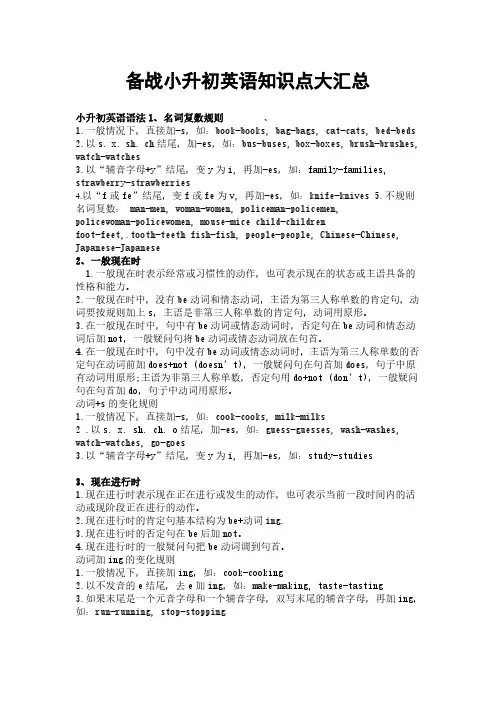
备战小升初英语知识点大汇总小升初英语语法1、名词复数规则、1.一般情况下,直接加-s,如:book-books, bag-bags, cat-cats, bed-beds2.以s. x. sh. ch结尾,加-es,如:bus-buses, box-boxes, brush-brushes, watch-watches3.以“辅音字母+y”结尾,变y为i, 再加-es,如:family-families, strawberry-strawberries4.以“f或fe”结尾,变f或fe为v, 再加-es,如:knife-knives5.不规则名词复数: man-men, woman-women, policeman-policemen,policewoman-policewomen, mouse-mice child-childrenfoot-feet,.tooth-teeth fish-fish, people-people, Chinese-Chinese, Japanese-Japanese2、一般现在时1.一般现在时表示经常或习惯性的动作,也可表示现在的状态或主语具备的性格和能力。
2.一般现在时中,没有be动词和情态动词,主语为第三人称单数的肯定句,动词要按规则加上s,主语是非第三人称单数的肯定句,动词用原形。
3.在一般现在时中,句中有be动词或情态动词时,否定句在be动词和情态动词后加not,一般疑问句将be动词或情态动词放在句首。
4.在一般现在时中,句中没有be动词或情态动词时,主语为第三人称单数的否定句在动词前加does+not (doesn’t),一般疑问句在句首加does,句子中原有动词用原形;主语为非第三人称单数,否定句用do+not (don’t),一般疑问句在句首加do,句子中动词用原形。
动词+s的变化规则1.一般情况下,直接加-s,如:cook-cooks, milk-milks2 .以s. x. sh. ch. o结尾,加-es,如:guess-guesses, wash-washes, watch-watches, go-goes3.以“辅音字母+y”结尾,变y为i, 再加-es,如:study-studies3、现在进行时1.现在进行时表示现在正在进行或发生的动作,也可表示当前一段时间内的活动或现阶段正在进行的动作。
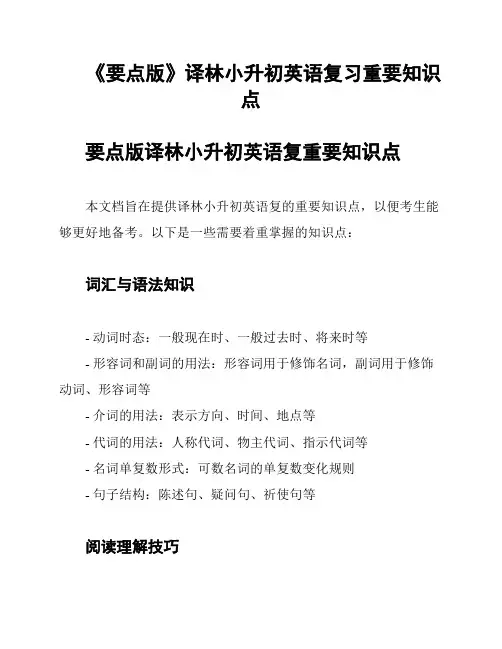
《要点版》译林小升初英语复习重要知识
点
要点版译林小升初英语复重要知识点
本文档旨在提供译林小升初英语复的重要知识点,以便考生能够更好地备考。
以下是一些需要着重掌握的知识点:
词汇与语法知识
- 动词时态:一般现在时、一般过去时、将来时等
- 形容词和副词的用法:形容词用于修饰名词,副词用于修饰动词、形容词等
- 介词的用法:表示方向、时间、地点等
- 代词的用法:人称代词、物主代词、指示代词等
- 名词单复数形式:可数名词的单复数变化规则
- 句子结构:陈述句、疑问句、祈使句等
阅读理解技巧
- 通读全文:在阅读之前先快速浏览整篇文章了解大意
- 注意关键词:通过寻找关键词来更好地理解文章内容
- 推理判断:根据文章中的线索进行推理和判断
- 查找细节:在回答问题时,根据问题定位找到相关细节信息- 注意文章结构:了解文章的段落结构和逻辑关系
写作技巧
- 开头与结尾:写作时要有恰当的开头和结尾,吸引读者注意并总结主要内容
- 逻辑连贯:段落之间的内容要有逻辑连接,使文章表达清晰连贯
- 使用连接词:使用适当的连接词来连接句子和段落,使文章更流畅
- 使用丰富的词汇和句型:避免重复使用相同的词汇和句型,提高写作质量和表达能力
- 注意语法和拼写:遵循正确的语法规则和拼写规范,避免出现错误
以上是译林小升初英语复习的重要知识点要点版,希望对考生备考有所帮助。
请考生结合课本和练习册进行有针对性的复习,多做练习题提高自己的英语水平。
祝考生取得好成绩!。
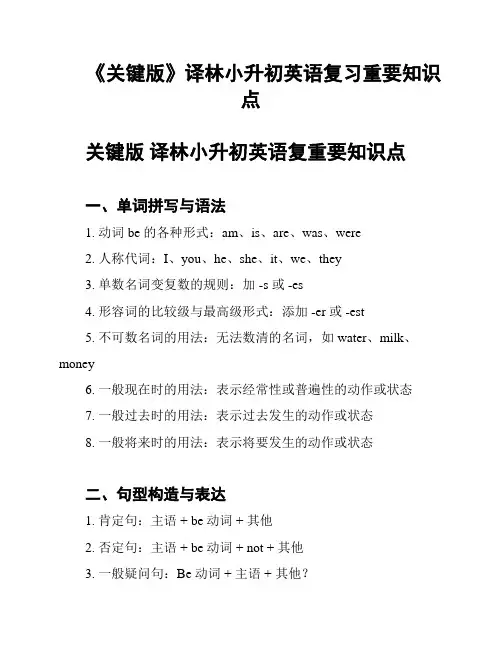
《关键版》译林小升初英语复习重要知识点关键版译林小升初英语复重要知识点一、单词拼写与语法1. 动词 be 的各种形式:am、is、are、was、were2. 人称代词:I、you、he、she、it、we、they3. 单数名词变复数的规则:加 -s 或 -es4. 形容词的比较级与最高级形式:添加 -er 或 -est5. 不可数名词的用法:无法数清的名词,如 water、milk、money6. 一般现在时的用法:表示经常性或普遍性的动作或状态7. 一般过去时的用法:表示过去发生的动作或状态8. 一般将来时的用法:表示将要发生的动作或状态二、句型构造与表达1. 肯定句:主语 + be 动词 + 其他2. 否定句:主语 + be 动词 + not + 其他3. 一般疑问句:Be 动词 + 主语 + 其他?4. 特殊疑问句:疑问词 + be 动词 + 主语 + 其他?5. 简略回答:Yes, 主语 + be. / No, 主语 + 不是.三、常见词汇与表达1. 问候语:Hello! / Hi! / How are you?2. 表示感谢:Thank you! / Thanks a lot! / I appreciate it!3. 介绍自己:My name is... / I am...4. 礼貌用语:Please / Excuse me / Sorry / May I...5. 身体器官:head、eyes、nose、mouth、ear、hand、leg、foot6. 学科课程:Chinese、English、Math、Science、Art、Music、PE四、常用句子与对话1. 自我介绍:Hello! My name is Lily. I am 10 years old. I amfrom China. Nice to meet you.2. 日常问候:Hi! How are you? / Good morning! / Good afternoon! / Good evening!3. 询问信息:What's your name? / How old are you? / Where are you from?4. 表达喜欢与不喜欢:I like English. It's fun. / I don't like Math. It's difficult.5. 询问与表达喜好:Do you like swimming? / Yes, I do. / No, I don't.6. 请求与表达许可:Can I borrow your pencil, please? / Yes, you can. / No, you can't.以上是《关键版》译林小升初英语复习的重要知识点,希望对你的学习有所帮助。
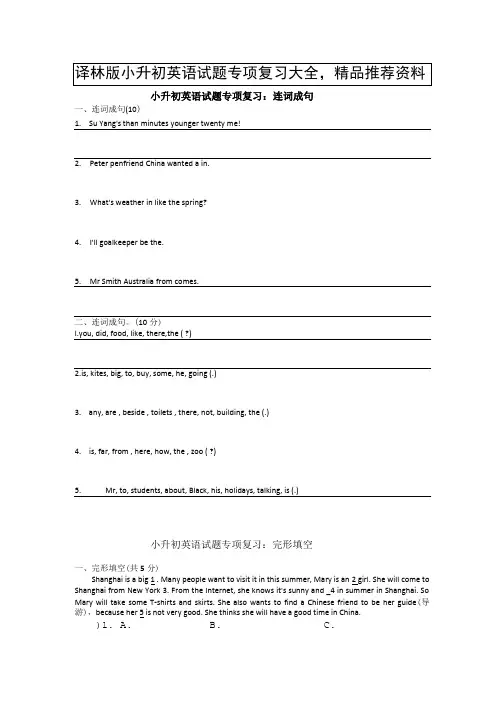
)1. A. country B.countrys C. cit小升初英语试题专项复习:连词成句一、连词成句(10)3. What's weather in like the spring?4. I'll goalkeeper be the.二、连词成句。
(10分)l.you, did, food, like, there,the ( ?)2.is, kites, big, to, buy, some, he, going (.)3. any, are , beside , toilets , there, not, building, the (.)4. is, far, from , here, how, the , zoo ( ?)5. Mr, to, students, about, Black, his, holidays, talking, is (.)小升初英语试题专项复习:完形填空一、完形填空(共5分)Shanghai is a big 1 . Many people want to visit it in this summer, Mary is an 2 girl. She will come to Shanghai from New York 3. From the Internet, she knows it's sunny and _4 in summer in Shanghai. So Mary will take some T-shirts and skirts. She also wants to find a Chinese friend to be her guide (导游),because her 5 is not very good. She thinks she will have a good time in China.一.选出一个与其它三个不同类将题号写在题前的括号内(r*io=io ,): 1 2 3 4 5 A first my amJanuary Bequiet B second mine is March No parking c three our are August No smoking D fourth his was Maths look around)2. A. American B. Japanese C.Chinese )3. A. by bike B. by plane C. on foot)4. A. cold B. cool C. hot)5. EnglishB. ChineseC.French完型填空。
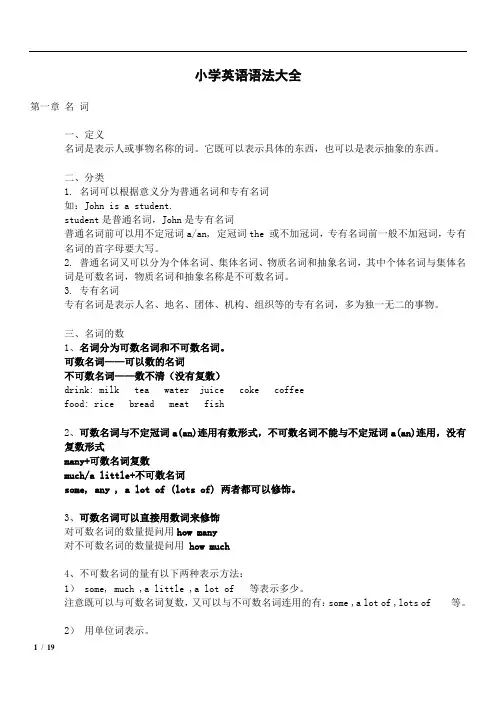
小学英语语法大全第一章名词一、定义名词是表示人或事物名称的词。
它既可以表示具体的东西,也可以是表示抽象的东西。
二、分类1. 名词可以根据意义分为普通名词和专有名词如:John is a student.student是普通名词,John是专有名词普通名词前可以用不定冠词a/an, 定冠词the 或不加冠词,专有名词前一般不加冠词,专有名词的首字母要大写。
2. 普通名词又可以分为个体名词、集体名词、物质名词和抽象名词,其中个体名词与集体名词是可数名词,物质名词和抽象名称是不可数名词。
3. 专有名词专有名词是表示人名、地名、团体、机构、组织等的专有名词,多为独一无二的事物。
三、名词的数1、名词分为可数名词和不可数名词。
可数名词——可以数的名词不可数名词——数不清(没有复数)drink: milk tea water juice coke coffeefood: rice bread meat fish2、可数名词与不定冠词a(an)连用有数形式,不可数名词不能与不定冠词a(an)连用,没有复数形式many+可数名词复数much/a little+不可数名词some, any , a lot of (lots of) 两者都可以修饰。
3、可数名词可以直接用数词来修饰对可数名词的数量提问用how many对不可数名词的数量提问用how much4、不可数名词的量有以下两种表示方法:1) some, much ,a little ,a lot of 等表示多少。
注意既可以与可数名词复数,又可以与不可数名词连用的有:some ,a lot of ,lots of 等。
2)用单位词表示。
用a ... of 表示。
如 a cup of (一杯......),a bottle of (一瓶......)a piece of (一张......),a pair of shoes(一双鞋)如two cups of tea(两杯茶),five pieces of paper(五张纸)注意单位词后的动词单复数形式往往取决于单位词的单复数形式;千、百等数词与名词加用,表示复数时,数词仍保持单数,名词变复数。
小升初英语复习重点系统语法学习。
小升初英语考试中单项选择比例占到15%-30%,同时,在其他各种题型中也都涉及到大量的语法知识。
进行系统的语法的学习非常必要。
重点词汇积累。
词汇量:一般重点中学的小升初英语考试,都要求学生具有2000到3000的词汇量,而且要求学生能读、能听懂这些单词,甚至要求孩子会拼写。
很多孩子认为小升初英语考试卷中的英文奥数题比较难,主要障碍就是很多单词不会,这样扣分之后,跟其他孩子就有差距了。
实际运用能力:知识学到手会用才是关键。
具体知识点:第一部分;基础知识1.字母:26个字母的大小写ABCDEFGHIJKLMNOPQRSTUVWXYZabcdefghijklmnopqrstuvwxyz2.语音:元音的发音五个元音字母:AEIOU12个单元音:长元音:/ɑ:/,/ɔ:/,/ə:/,/i:/,/u:/短元音:/æ/ /e/ /i/ / ɔ / /∧/ /u/ /ə/3.词汇:词汇量,近反义词4.句子:大小写,标点符号第二部分:语法知识一.名词:名词单复数,名词的格(一)名词单复数1.一般情况,直接加-s,如:book-books, bag-bags, cat-cats, bed-beds2.以s. x. sh. ch结尾,加-es,如:bus-buses, box-boxes, brush-brushes, watch-watches 3.以“辅音字母+y”结尾,变y为i, 再加-es,如:family-families, strawberry-strawberries4.以“f或fe”结尾,变f或fe为v, 再加-es,如:knife-knives5.不规则名词复数:man-men, woman-women, policeman-policemen, policewoman-policewomen, mouse-micechild-children, foot-feet, tooth-teeth, fish-fish, people-people, Chinese-Chinese, Japanese-Japanese不可数名词的复数就是原型:paper, juice, water, milk, rice, tea (二)名词的格(1) 有生命的东西的名词所有格:a)单数后加’s 如: Lucy’s ruler my father’s shirtb)以s 结尾的复数名词后加’如: his friends’ bagsc)不以s 结尾的复数后加’s children’s shoes●并列名词中,如果把’s加在最后一个名词后,表示共有, 如:Tom and Mike’s car 汤姆和迈克共有的小汽车●要表示所有物不是共有的,应分别在并列名词后加’sTom’s and Mike’s car s 汤姆和麦克各自的小汽车(2)表示无生命东西的名词通常用“ of +名词”来表示所有关系:如:a picture of the classroom a map of China二.冠词:不定冠词,定冠词种类:(1)不定冠词:a / an a unit / an uncle元音开头的可数名词前用an :an egg / an apple / an orange / an eraser / an answer / an ID card / an alarm clock / an actor / an actress / an e-mail / an address / an event / an example / an opera / an houran old man / an interesting book / an exciting sport / an action movie / an art lesson /(2)定冠词:the the egg the plane2. 用法:定冠词的用法:(1)特指某(些)人或某(些)物:The ruler is on the desk.(2)复述上文提到的人或物:He has a sweater. The sweater is new.(3)谈话双方都知道的人或物:The boys aren’t at school.(4)在序数词前:John’s birthday is February the second.(5)用于固定词组中:in the morning / afternoon / evening不用冠词的情况:(1)专有名词前:China is a big country.(2)名词前有定语:this , that , my , your , some, any , no 等:This is my baseball.(3)复数名词表示一类人和事:Monkeys can’t swim. They are teachers.(4)在节日,日期,月份,季节前:Today is Christmas Day. It’s Sunday.(5)一日三餐前:We have breakfast at 6:30.(6)球类棋类运动前:They often play football after class. He plays chess at home.* 但乐器前要用定冠词:I play the guitar very well.(7)学科名称前:My favorite subject is music.(8)在称呼或头衔的名词前:This is Mr Li.(9)固定词组中:at noon at night by bus三、代词:人称代词,物主代词人称代词物主代词主格宾格第一单数I(我)me my(我的)人称复数we(我们)us our(我们的)第二人称单数you(你)you your(你的)复数you(你们)you your(你们的)第三人称单数he(他)him his(他的)she(她)her her(她的)it(它)it its(它的)复数they(他们/她们/它们)themtheir(他们的/她们的/它们的)四、形容词,副词:比较级,最高级(一)、形容词的比较级1、形容词比较级在句子中的运用:两个事物或人的比较用比较级,比较级后面一般带有单词than。
译林版小升初英语知识点大汇总一、动词时态一般现在时1、概念:表示经常发生的动作或存在的状态。
2、时间状语:always,usually,often,sometimes,everyday/week/month/year,once a week/day/month/year,on Sundays,in the morning/afternoon/evening。
3、基本用法1)肯定的陈述句:主语+动词+其他成分。
如:I have a pen.我有一支钢笔。
2)否定的陈述句:主语+don’t/doesn’t+动词原形+其他成分。
如:I don’t like basketball.我不喜欢篮球。
4)一般疑问句:Do/Does+主语+动词原形+其他成分?肯定回答:Yes,主语+do/does。
否定回答:No,主语+don’t/doesn’t。
如:-Do you like English?你喜欢英语吗?-Yes,I do.是的,我喜欢。
-Do they have a computer?他们有一台电脑吗?-No,they don’t.不,他们没有。
现在进行时1、概念:表示正在发生的动作或存在的状态。
2、时间状语:now,at present,in the am/pm,this week/month/year,等。
3、基本用法:主语+be+动词ing+其他成分。
如:We are doing our homework now.我们现在正在做我们的家庭作业。
二、物主代词顺口溜记忆法物主代词分两种,形容词性名词性。
形容词性能力弱,后面跟着名词来修饰。
名词性独立主格,后面没有名词跟着走。
他的她的它的物,名词性物主代词单独使用。
三、名词所有格用法顺口溜名词所有格有两种形式:’s和of。
一般情况下,有生命的名词所有格用’s来表示;无生命的名词所有格用of来表示。
名词所有格的用法口诀:名词所有格,表物是“谁的”,若为生命词,加’s即可行,词尾有s,仅把逗号择;并列名词后,各自和共用,前者分别加,后者最后用;定冠词接名词,“谁的”或“共同”,疑问词意“什么”,三者均不行;省略of表所有,一般加名词;普通没有生命词,我们用of来描写。
译林小升初英语复习重要知识点
一、单词拼写(Spelling)
1.基础词汇:学生需要掌握常见的英文基础词汇的拼写,包括名词、动词、形容词、副词等。
2.重点词汇:学生还需要重点掌握一些高频词汇的拼写,如数字、颜色、天气、动物、水果等。
二、句型转换(Sentence transformation)
1.陈述句变为否定句和疑问句:学生需要熟练掌握句子的否定和疑问形式。
2.直接引语变为间接引语:学生需要熟练掌握将直接引语变为间接引语的转换规则。
三、选择题(Multiple choice)
1.选择适当的单词或词组填空:学生需要根据上下文意思选择适当的单词或词组填入空白处。
2.选择正确的答案填空:学生需要根据问题选择正确的答案填空。
四、完形填空(Cloze)
1.根据上下文意思选择适当的单词填空:学生需要根据上下文意思选择适当的单词填入空白处。
2.根据上下文意思选择适当的词组或句子填空:学生需要根据上下文意思选择适当的词组或句子填入空白处。
1.根据文章内容选择正确的答案:学生需要根据文章内容选择正确的答案。
2.根据文章内容回答问题:学生需要根据文章内容回答问题。
六、书面表达(Writing)
1.写作题目:学生需要根据提供的写作题目进行写作练习。
2.翻译练习:学生需要将中文句子或段落翻译成英文。
3.根据图片或提示写作:学生需要根据提供的图片或提示进行写作练习。
通过对以上几个重要知识点的复习,学生可以提高自己的英语能力,做好小升初英语考试的准备。
希望学生能够认真复习,提升自己的英语水平,取得优异的成绩。
牛津译林版英语小升初复习试题与参考答案一、听力部分(本大题有12小题,每小题2分,共24分)1、Listen to the following dialogue and choose the best answer to the question.A. Where are they going?B. What are they doing?C. How are they feeling?You will hear:M: I can’t believe it’s already time for us to go to middle school.W: I know, it feels like just yesterday we were in elementary school.Questions:1、What are they talking about?A. They are talking about their future.B. They are talking about their past.C. They are talking about their current school.Answer: CExplanation: The dialogue is about the transition from elementary school to middle school, indicating that they are discussing their current school situation.2、Listen to the following instructions and complete the table with the correct information.You will hear:W: Good morning, students. Please take out your notebooks and write down these instructions.For the next three months, we will be focusing on grammar and vocabulary. There will be a quiz every two weeks.Make sure to study hard and keep up with the lessons.Questions:2、What are the students expected to do for the next three months?A. They are expected to improve their listening skills.B. They are expected to focus on grammar and vocabulary.C. They are expected to take part in group activities.Answer: BExplanation: The speaker specifically mentions that the students will be focusing on grammar and vocabulary for the next three months, indicating this is their expected task.3.You are listening to a conversation between a teacher and a student. The teacher is asking about the student’s weekend plans. Listen to the conversation and choose the correct answer.A. The student will go to the movies with friends.B. The student will visit their grandparents.C. The student will have a sleepover at a friend’s house.Answer: BExplanation: In the conversation, the student mentions that they will visit their grandparents in the country, which corresponds to option B.4.Listen to a short dialogue between two students discussing their favorite subjects in school. Choose the correct answer based on what you hear.A. The first student likes science, and the second student likes art.B. The first student likes history, and the second student likes math.C. The first student likes literature, and the second student likes physics.Answer: AExplanation: In the dialogue, the first student says they enjoy science because it’s interesting, and the second student mentions that they like art because it allows them to be creative. This corresponds to option A.5、Listen to the dialogue and choose the best answer to the question you hear.Question: What is the relationship between the two speakers?A. Brother and sisterB. Teacher and studentC. FriendsD. ClassmatesAnswer: CExplanation: In the dialogue, the speakers are discussing their plans to meet up after school, which indicates that they are friends.6、Listen to the passage and answer the question.Question: What is the main purpose of the passage?A. To describe the process of making a cup of coffeeB. To explain the benefits of a healthy dietC. To give advice on how to improve one’s English skillsD. To discuss the history of a famous buildingAnswer: CExplanation: The passage provides advice and tips on how to improve English skills, such as practicing regularly, using a dictionary, and reading books in English. The other options are not mentioned in the passage.7、You will hear a short dialogue between two friends talking about their weekend plans. Listen carefully and choose the correct answer to the question you hear.Question: What are they planning to do on the weekend?A. Go to the moviesB. Visit a museumC. Play in the parkAnswer: B. Visit a museum.Explanation: In the dialogue, one friend mentions they have heard about an exciting new exhibit at the local museum and suggests going there on Saturday. The other friend agrees, saying that it sounds like a great idea. Therefore, the correct answer is B, visit a museum.8、Listen to a conversation between a student and a teacher discussing abook report. Pay attention and answer the following question.Question: What does the teacher suggest the student should focus on in their book report?A. The main character’s developmentB. The historical context of the storyC. The author’s writing styleAnswer: A. The main character’s development.Explanation: During the conversation, the teacher advises the student to pay particular attention to how the main character changes throughout the book and what can be learned from those changes. Thus, the teacher’s suggestion points towards focusing on the main character’s development, making A the correct answer.9.Listen to the conversation between two students discussing their weekend plans and answer the following question:What does the boy plan to do on Saturday?A. Go to the movies.B. Visit his grandparents.C. Go for a hike with his friends.Answer: BExplanation: In the conversation, the boy mentions that he is going to visit his grandparents in the countryside on Saturday, which is option B.10.Listen to the dialogue between a teacher and a student discussing a schoolproject and answer the following question:What advice does the teacher give to the student about the project?A. To choose a topic that interests them.B. To work on the project alone.C. To spend more time on research.Answer: AExplanation: The teacher emphasizes the importance of choosing a topic that the student is interested in, as it will make the project more enjoyable and likely to be successful. This corresponds to option A.11.You are listening to a conversation between two friends, Alex and Emily. They are discussing their favorite subjects in school. Listen to the conversation and answer the question.Question: What is Alex’s favorite subject?A. MathematicsB. EnglishC. ScienceD. HistoryAnswer: A. MathematicsExplanation: In the conversation, Alex says, “Mathematics is my favorite subject because it’s fun and challenging.” This indicates that Alex’s favorite subject is Mathematics.12.Listen to a short dialogue between a teacher and a student, where theyare discussing the student’s performance in a recent test. Answer the question after listening.Question: How did the student perform in the recent test?A. Very wellB. Not too wellC. PoorlyD. AverageAnswer: B. Not too wellExplanation: The teacher says, “I’m a bit concerned about your recent test performance. It seems you didn’t do as well as expected.” This implies that the student did not perform too well in the recent test.二、选择题(本大题有12小题,每小题2分,共24分)1、Which of the following words has a different vowel sound?A) bedB) redC) ledD) readAnswer: D) readExplanation:In options A, B, and C, the vowel ‘e’ makes a short ‘e’ sound. However, in option D, ‘read’ can be pronounced as /riːd/ with a long ‘ea’ sound when used as a past tense verb, or /red/ with a short ‘ea’ soundwhen used as an adjective or present tense verb. Here, we’re likely referring to the pronunciation where ‘ea’ is pronounced like ‘ee’, making it different from the others.2、Choose the correct form of the verb to complete the sentence:My friends_______playing soccer after school.A) enjoyB) enjoysC) enjoyingD) enjoyedAnswer: A) enjoyExplanation:The subject “My friends” is plural, so we need a verb that agrees with this subject in number. Option A “enjoy” is the correct choice becaus e it matches the plural subject “My friends”. Options B and D use incorrect verb forms for the present tense and plural subject, and option C is not suitable because it would require an auxiliary verb to be grammatically correct.3、The sentence “She hasn’t been to the beach for three months.” is an example of a sentence with which tense?A)present perfectB)past perfectC)present continuousD)past continuousAnswer: A) present perfectExplanation: The sentence “She hasn’t been to the beach for three months.” uses the present perfect tense to express an action that started in the past and continues to the present or is still relevant in the present. The phrase “for three months” indicates a duration that started in the past and continues up to the present.4、Ch oose the correct word to complete the sentence: “The sun_______up at6 a.m. every day.”A)roseB)raisesC)has risenD)is risingAnswer: A) roseExplanation: The correct answer is “rose” because it is the simple past tense of the verb “rise,” which is used to descr ibe the action of the sun rising in the morning. The sentence is talking about a habitual action that happens every day, and the simple past tense is used for such habitual actions in the past. The other options are either in the present tense or the present perfect tense, which are not suitable for describing a daily routine.5、Choose the word that best completes the sentence.The teacher asked the students to__________ their notebooks and pay attention to the lecture.A. openB. closeC. writeD. drawAnswer: AExplanation: The correct answer is “open” because the teacher is asking the students to open their notebooks, which is necessary to follow the lecture. “Close” would be the opposite action, “write” and “draw” are not relevant to the action of paying attention to a lecture.6、Select the sentence that is grammatically correct.A. She don’t like to go to the movies.B. They are eating ice cream in the park.C. He has gone to the store already.D. I didn’t finish my homework because I was sick.Answer: DExplanation: The correct answer is “I didn’t finish my homework because I was sick.” This sentence is grammatically correct as it uses the past simple tense correctly for the main clause (“I didn’t finish”) and the reason clause (“because I was sick”).The other options contain grammatical errors: “She don’t” should be “She doesn’t,” “They are eating” is in the present continuous tense, which is not appropriate in this context, and “He has gone” should be “He has been” to indicate a continuous state.7、Which of the following words has a different pronunciation for the underlined part?A. cityB. catC. cupD. cleanAnswer: A. cityExplanation:In option A, ‘city’, the letter ‘c’ is pronounced as /s/ due to the ‘i’ that follows it, whereas in the other options, ‘c’ is pronounced as /k/. This question tests the student’s understanding of the pronunciation rules for the letter ‘c’ in English.8、Choose the correct word to complete the sentence:I will go to the party if I________my homework before 6 o’clock.A. will finishB. finishesC. finishedD. finishAnswer: D. finishExplanation:The correct choice is ‘finish’ because after ‘if’ we use the present simple tense to talk about future events that are likely to happen. The main clause uses ‘will’ to express the future, so the conditional clause should be in the present simple form. This tests the students’ knowledge of conditional sentences in English.9.Choose the correct word to complete the sentence:The cat was___________in the corner of the room.A)lyingB)lying downC)laidD)laid downAnswer: B) lying downExplanation: The correct phrase here is “lying down,” which means the cat is resting in a horizontal position. “Lying” by itself is the present participle of the verb “lie” and does not convey the idea of the cat being in a particular position. “Laid” is the past tense and past participle of “lay,” which is used for inanimate objects or animals that cannot perform actions, but it doesn’t fit the context either. “Laid down” is a phrasal verb that means to put something down, which is not what the sentence is describing.10.Select the sentence that correctly uses the given word in context:Given word: “Abandon”A)The children___________their toys in the park.B)The old house was___________to the city.C)The artist___________his paintbrushes for the day.D)The company___________the plans for the new project.Answer: D) The company___________the plans for the new project.Explanation: The correct use of “abandon” in context is in sentence D. “Abandon” means to forsake or give up entirely, and it fits well with the subject “the company” and the object “the plans for the new project.” Theother sentences do not use “abandon” correctly:•Sentence A should use “left” or “have left” to indicate t he children left their toys.•Sentence B should use “abandoned” to indicate the old house was given up by the city.•Sentence C should use “put down” or “set aside” to indicate the artist is finishing his work for the day.11.Choose the word that best completes the sentence.The cat was so______that it didn’t notice the dog approaching.A. nervousB. excitedC. unawareD. attentiveAnswer: C. unawareExplanation: The correct answer is “unaware” because it implies that the cat did not realize the dog was getting close. The other options do not fit the context as well: “nervous” would suggest the cat was scared, “excited” would imply the cat was happy about something, and “attentive” would mean the cat was watching the dog closely.12.Select the sentence that has a subject-verb agreement error.A. Each of the students has their own book.B. Both of the boys are playing outside.C. Neither of the cats has been fed.D. The majority of the students has passed the test.Answer: A. Each of the students has their own book.Explanation: The correct sentence should have “has” instead of “their,” as “each” is singular. The other options have correct subject-verb agreements: “Both of the boys” is plural, “neither of the cats” is singular, and “The majority of the students” is singular.三、完型填空(10分)Instructions: Read the passage carefully and choose the best answer to fill in each blank from the four choices given. Write your answers on the line provided.Last summer, I went on a trip to the countryside with my family. It was a sunny day, and we were all very (1) ______. We packed our bags early in the morning and set off at 7:00 am. The drive took about two hours, and during the journey, we played games and sang songs, which made the time pass (2) ______.When we arrived, the first thing we did was to go for a walk around the beautiful lake. The water was so (3)______that we could see the fish swimming below. After the walk, we had a picnic under a big tree. My mom had prepared sandwiches, fruit, and some homemade lemonade, which was (4)______on such a hot day. In the afternoon, we rented a boat and rowed on the lake. It was a bit tiring but (5) ______. We all agreed it was a perfect day, and we can’t wait to go back again next year.1.__________2.__________3.__________4.__________5.__________A. exciting /B. clear /C. refreshing /D. enjoyable /E. quicklyAnswers:1.A. exciting2.E. quickly3.B. clear4.C. refreshing5.D. enjoyableWould you like me to create another cloze test question or do you need any modifications to this one?四、阅读理解(26分)Reading ComprehensionPassage:The British Library is a national library in London, England. It is the largest library in the world in terms of the number of items held. The library was founded in 1753 and holds over 150 million items, including books, manuscripts, maps, music scores, and more. The library’s collection is divided into two mainsections: the British Library and the British Library Reading Rooms.The British Library is located in St. Pancras, London. It was designed by Sir John Soane and is an architectural masterpiece. The building has a large glass dome, which is a symbol of the library’s commitment to openness and accessibility. Visitors can explore the library’s collect ion through guided tours or by using the library’s online resources.One of the most famous collections in the British Library is the Codex Sinaiticus, a copy of the Bible that was written in the 4th century. This ancient manuscript is one of the oldest complete manuscripts of the Bible and is considered a priceless piece of history.Questions:1.What is the main purpose of the British Library?A) To house historical artifactsB) To provide access to a vast collection of books and other itemsC) To host art exhibitionsD) To promote British literature2.Where is the British Library located?A) In the heart of LondonB)In St.Pancras, LondonC)In the City of WestminsterD)In the Royal Borough of Kensington and Chelsea3.What is the significance of the Codex Sinaiticus in the British Library’s collection?A) It is a rare book collectionB) It is a collection of historical mapsC) It is the oldest complete manuscript of the BibleD) It is a collection of music scoresAnswers:1.B2.B3.C五、写作题(16分)Title: A Journey Through the CountrysideThis past summer, I embarked on a memorable journey through the lush countryside with my best friend, Lily. Our adventure began early one morning as we set off on foot from our village, armed with a map, a compass, and a sense of curiosity. The sun was just rising, casting a golden glow over the rolling hills that stretched out before us like a vast green carpet.As we walked along the winding dirt path, the air was filled with the sweet fragrance of wildflowers and the chirping of birds perched high in the trees. We chatted excitedly about the possibilities that lay ahead, our imaginations fueled by tales of hidden treasures and secret trails. Suddenly, the path forked, and we had to decide which direction to take. After consulting our map, we chose the route that led up a steep incline.The climb was challenging, but it rewarded us with breathtaking views ofthe valley below. Reaching the peak, we discovered a small, tranquil pond surrounded by tall grasses swaying gently in the breeze. It was there that we met Old Tom, a friendly local who regaled us with stories of the land and its history. He taught us about the different plants growing around the pond and how they were used by the villagers in the old days.By the time the sun began to set, painting the sky in hues of orange and pink, we realized it was time to head back home. Tired but fulfilled, we retraced our steps, our hearts filled with gratitude for the day’s adventure. This journey not only allowed us to explore the beauty of nature but also taught us the importance of friendship, courage, and the joy of discovery.Analysis:This essay demonstrates the student’s ability to describe an imaginary summer adventure vividly using descriptive language and narrative skills. The writer has included all the necessary elements: setting, characters, plot development, and a reflective conclusion that ties back to the theme of learning and growth. The use of sensory details such as the fragrance of wildflowers and the sounds of birds enriches the storytelling experience, making it engaging for the reader. Additionally, the inclusion of a character like Old Tom adds depth to the narrative and provides an opportunity for the protagonist to learn something valuable from the experience. Overall, the essay meets the requirements set forth in the instructions while providing a clear and coherent story that is both interesting and educational.。
新牛津译林版小升初复习讲义听力部分30分一.听句中含有的词二.选图片Which picture are they talking about?No eating or drinking图片___No littering图片___No parking_____No smoking___Danger___Wet floor____No fishing__No pets/dogs___Students/school图片__三.听问题选答句四.判断所给句子与所听内容是否相符笔试部分70分五.判断下列句子中划线部分的读音是否相同,都相同T,一个或一个以上不同的Fboy toy joyair fair chair hairwindow snow know slow show howshouts house mouth out mouse sound loudlyshort horses sport for worldbook cook look good looking foot toothschool cool classroom afternoon food room zoo soonbird girl birthday dirty shirt skirtmother teacher worker sister summer winterYear nearly dear hear earth learn wearcard Mark party park arm hard sharp warm largeThis father the that’s mother brother these they earthThirty-three birthday mouth thank thin think togetherQuick queen quiet quitemorning sing growing evening blowing bring springCharlie bench chicken China Chinese March chair lunch much teach Christmas Sharon shoe shop she shiny shoes sheep shipTraffic Trains trees travel trousersAndrew drink Andrea drawing dress driver六.单项选择从A.B.C三个选项中选择最佳答案10分七.用括号中所给单词的适当形式填空8分八.根据图意完成对话或句子,每空一词.5分九.从Ⅱ栏中选择与I中相对应的答句.6分十.从方框中选择合适的内容完成对话,有一项是多余的.5分十一.从方框中选择短语完成句子,每个短语限用一次.6分十二.完形填空10分十三.阅读理解10分____ 关于(五A4)111(15) 170(28)How about____ football?(play)a cup of tea/coffee____(四A6)three ___ of coffee(cup)a cup of tea, a cup of coffee____ 几个(六B3)112(24)后接可数____:如a few___(orange), ____ students A. B. C. D._____ 害怕的 (五A1) be afraid of ...I'm afraid ___dogs.Why are you afraid of____?(he)_____ 下午(四B1)Let’s ____skating this afternoon.after _____(五A8) _____放学后(四B2)again _____(四B4)_______ 一杯(四A6) a glass of juice超过一杯时 glass 要用复数three____ of water(glass)ago ......以前(六A4)Six years ago, Mike___ read and draw .Now he___do many things.(can)ten minutes ago, two weeks ago动词要用_________空气(六A6)___ the airah 啊 (三A8)_____ 一点(六B3)后接_____169(16)____milk, ___ water也可以接形容词、副词,表示程度a little afraid___, a little sad ____She drinks ____ water after meals.all ____(五A8)三者三者以上137(5)both两者 91(8)all day and all nightall the____(students)_____ 全世界(六A4)All right. ____。
毕业班英语专项复习---选择填空( ) 1. Please _________ take photos here.A. can’tB. shouldn’tC. don’t( ) 2. Where ______ you two days ago? I _______ in Beijing.A. was, wasB. was, wereC. were; was( ) 3. The two men wanted to make new clothes _______ the king.A. toB. forC. with( ) 4.The king walked through the city _______ his new clothes.A. wearB. put on C .in( ) 5.I got a card_______ my good friend Mark.A. fromB. toC. with( ) 6.The old man _______ a flower for his daughter.A. pickB. pickingC. picked( ) 7.People looked at the king and shouted, “_______ beautiful clothes!”A. HowB. WhatC. What a( ) 8. A little boy laughed, “Ha! Ha! The king isn’t wearing_______ clothes!”A. aB. someC. any( ) 9. The lion was nice _______ the girl.A. toB. onC. for( ) 10.The lion turned _______ a prince.A. inB. intoC. at( ) 11.It was windy. We _______ kites.A. can flyB. could flyC. could flew( ) 12.Liu Tao was ill. He _______some medicine.A. takesB. takeC. took( ) 13.We usually eat _______ at the Dragon Boat Festival.A. turkeyB. rice dumplingsC. moon cakes( ) 14.Don’g laugh_______ the old man. He was ill and hungry.A. with B .in C. at( ) 15. ______ _ the kite. Don’t let it fly away.( ) 16.Jack, you look cool in the red T-shirt. ____________A. No, I’m not cool.B. Yes, I am.C. Thank you.( ) 17.---Would you like _______ mango juice?---No, thanks. There’s _______ in my glass.A. some; someB. any; someC. some; any( ) 18.It rained all day_______ 12th April.A. atB. inC. on( ) 19.Where did Miss Li go_______ the holiday?A. orB. withC. to( ) 20. I went to the hospital because a dog my leg .A. biteB. bitC. bites( ) 21.He wanted _________ some fruit for the picnic.A. buyingB. to buyC. bought( ) 22. _________ did you get up this morning? At six thirty.A. HowB. WhatC. When( ) 23. Liu Tao’s grandparents live_________ the farm.A. inB. onC. at( ) 24.How was the weather yesterday? It was_________.A. rainB. rainedC. rainy( ) 25.Would you like _________ juice?A. someB. manyC. any( ) 26.In the _________, people call the metro “subway”B. Japan( ) 27. It was Children’s Day yesterday. The children were very . They played at the party.A. excited; happilyB. excitedly; happyC. excited ; happy( ) 28.Bobby a banana _________ Sam.A. give toB. gave toC. gave for( ) 29.He _________ a bus to the supermarket yesterday.A. takeB. takesC. took( ) 30. Nancy and Yang Ling _________ after school every day.A. walk to homeB. walk to the homeC. walk home( ) 31.Who likes living in a big city? Jim_________.A. isB. wasC. does( ) 32.We shouldn’t eat _________ in the evening. It’s bad for us.A. too manyB. too muchC. so many( ) 33.The watch on the desk is _________. Please give it to _________.A. Tina’s ; himB. Mike’s; herC. Lucy’s; her( ) 34.They often play football _________ Tuesday afternoon.A. onB. inC. for( ) 35.There is a map _________ our city _________ the wall.A. in; onB. of; onC. of; in( ) 36.My mother _________ tangyuan this morning.A. makesB. madeC. is making( ) 37.What are you going to make for dinner? I _________ some dumplings.A. am makingB. am going to makeC. made( ) 38.How was your Chinese New Year? It was _________.A. a great funB. excitedC. great fun( ) 39. I am _________ my hamburger. I_________ it for lunch.A. look for; bringB. looking for; bringsC. looking for; brought ( ) 40.We use plastic to make bags, but too_________ plastic is bad for the Earth.A. manyB. muchC. little( ) 41.My family and I _________ tomorrow.A. bought a lot of thingsB. are buying a lot of thingsC. are going to buy a lot of things.( ) 42.The floor is wet. We shouldn’t _________ here.A. runB. be carefulC. eat or drink( ) 43.Did Nancy play the piano at the party? No, she_______A. she can’tB. she doesn’tC. she didn’t( ) 44. This is David speaking. Who’s that? _______.( ) 45.Can I have _______ orange juice?Sorry, there isn’t _______ juice in the fridge.A. any; anyB. any; someC. some; any( ) 46.My father is _______ holiday.A. inB. atC. on( ) 47.Who invented the train? The_______.A. CanadiansB. AustraliansC. British( ) 48.My aunt often calls her friend. She _______ writes emails to them.A. alsoB. tooC. either( ) 49. Don’t _______ Tim. Helen is doing her homework.A. shoutedB. shoutC. shouting( ) 50.My trousers are on the floor. _______ for me, please.A. Pick up themB. Pick it upC. Pick them up( ) 51. May 21st reads ________.A. May twenty-oneB. the May twenty-firstC. May the twenty-first( ) 52. “Keep off the grass” means we ______ walk on the grass.A. canB. shouldn’tC. mustD. should ( ) 53. To keep healthy, we should _________.A. do more exerciseB. eat many foodC. sleep early and get up late ( ) 54. He _______ a banana skins on the ground.A. giveB. putsC. throwsD. litter( ) 55. Mr Green usually _______ to his friends when he was young.A. writeB. is writingC. wroteD. write( ) 56. Does the sign_______ ‘No_______’?——Yes, it does.A. say, writingB. says, writeC. says, writingD. say, write( ) 57. —Why we_______ swim in the river?—Can’t you see the sign ‘No swimming’ there?A. canB. shouldC. can’tD. shouldn’t.( ) 58. Where were my shoes? __________A. It’s on the desk.B. They are under the desk.( ) 59. We should ________ the floor every day.A. cleanB. washC. sweep( ) 60. I called_______ yesterday afternoon. But she_______ in.A. she, isn’tB. her, wasn’tC. her, isn’t( ) 61. ---What’s the first day of the week?--- It’s_______ .A. MondayB. TuesdayC. Sunday( ) 62. I read __________ about animals.A. a lot ofB. lot ofC. lots of( ) 63. We can’t eat______ drink in the library.A. orB. andC. but( ) 64. Someone_____ singing in the room. Can you_____ it?A. is; hearB. are; hearC. are; listen( ) 65. You can’t take your juice________ the supermarket.A. inB. intoC. on( ) 66. What________ our city messy.A. makeB. makingC. makes( ) 67. Look at these signs. They ________we shouldn’t _______the tree.A. means; climbB. mean; climbingC. mean; climb( ) 68. The_______ near the window are funny.A. signsB. signC. sign’s( ) 69. Helen always_______ home.A. walkB. walksC. walks to( ) 70. Mary can’t _______her bag. Now she _______.A. find; is looking forB. look for; is findingC. find; look for ( ) 71. He _______ at school yesterday.A. isn’tB. wasn’tC. doesn’tD. didn’t( ) 72. He wrote a letter ________ his mother last week.A. forB. toC. ofD. from( ) 73. Can you make a sentence _______“have”?.A. inB. onC. withD. by( ) 74. ---_________ is it? ---It’s Friday.A. What dateB. What dayC. What colourD. What about ( ) 75. ---What’s Helen________? ---Her new bag.A. lookingB. looking forC. lookD. look for ( ) 76. The football match is very ________..A. exciteB. excitesC. excitedD. exciting ( ) 77. ______ your mother see a film yesterday evening?.A. AreB. DidC. WasD. Is( ) 78. I usually ________ to school by bike when I was ten years old.A. goB. goesC. wentD. going( ) 79. I _______ you, but you _______ at home.A. call; weren’tB. called; aren’tC. called; wereD. called; weren’t ( ) 80. Everything ________ .A. go wellB. go goodC. goes wellD. goes good ( ) 81. I ______ TV a moment ago.A. watchB. watchedC. lookedD. look ( ) 82. The teacher_________ the blackboard, then we copied the words.A. point atB. pointed atC. is pointing atD. points at( ) 83. Do you want ________?A. visit the forestB. visiting the forestC. to visiting the forestD. to visit the forest( ) 84. Each student ____________one picture.A. drawB. drawsC. drawingD. to drawing ( ) 85. She usually _______ new clothes___________his doll.A. makes…withB. make…forC. makes…forD. make…with ( ) 86. The lion always walks ______ the forest every day.A. onB. underC. throughD. behind( ) 87. Were there ________ people in the street?A. someB. anyC. muchD. a( ) 88. What ________ beautiful girl!( ) 89. The shoes are very cool, but they__ _ me.A. are fittingB. fitC. don’t fitD. fitted( ) 90._________ like to wear a kilt.A. The ChineseB. The ScottishC. The AmericanD. The English ( ) 91._______ it often ______ in winter in Kunming?A. Does; windyB. Does; windsC. Is; windyD. Does, wind ( ) 92. It is_______ now. It often__ here in spring.A. raining; rainyB. raining; rainsC. rained; rainyD. rained; rains ( ) 93. It__________ in the morning.A. sunnyB. rainedC. rainyD. windy ( ) 94. I called__________, but he wasn’t at home.A. youB. heC. himD. your ( ) 95.Would you like to go there, too? __________A. Yes, I’d love to.B.Yes, I’d like.C. Yes, I would.D. Yes, I do. ( ) 96. Where __________ you a week ago? I __________ in Beijing.A. was, wereB. was; wasC. were; wereD. were, was ( ) 97. Yesterday I __________some flowers __________ the shop.A. bought; toB. bought; fromC. bought; about( ) 98 . It often__________ in spring here.A. rainsB. rainyC. rained( ) 99.They__________ write letters to their friends twenty years ago.A. canB. couldn’tC. could( ) 100. Would you like__________ orange juice? No, __________.A. any, I wouldn’tB. any; thanksC. some, thanks( ) 101. Can I __________ a film? No, you must __________ the books.A. look; lookB. watch; readC. watch; reading( ) 102. ---Please don’t litter here.---__________.A. Not at all.B. I’m sorry.C.You’re welcome.( ) 103. Do you want __________juice? No, thank you.( ) 104. They went there ____________bus last Sunday.A. by B took C. take( ) 105. The_______ near the window are funny.A. signsB. signC. sign’s( ) 106. ______ the river dirty? No, it _________.A. Is, isB. Does, doesn’tC. Is, isn’t.( ) 107Mary can’t _______her bag. Now she _____ it.A. find; is looking forB. look for; is findingC. find; look for ( ) 108. Black smoke ____________the air dirtyA. helps B makes C. make( ) 109. There are a lot of ____________in the river.A. fish B air C. water( ) 110. Sometimes he _______ pictures, but now he_______.A. draws; singsB. drawing; singingC. draws; is singing ( ) 111. Bobby is sick . He goes ___________hospitalA. toB. to theC./( ) 112.--- How did you go to the park yesterday?---- I a bus.A. byB. takeC. took( ) 113. What can we do ___________ our room clean?A. keepB. to keepC. keeping( ) 114. Many people like ____________ the city.A. livingB. liveC. living in( ) 115. Mike kicked(踢) the ball so . It flew out of the park .A. wellB. fastC. hard ( ) 116. I’m . I want to have aA. sleepy ; sleepB. sleep ; sleepyC. sleeping ; sleep ( ) 117. Nancy will go to the zoo ,but she doesn’t know how to .A. get to thereB. gets thereC. get there( ) 118. How many do you want ?A. glass of apple juiceB. glass of apple juicesC. glasses of apple juice( ) 119. Fruit and vegetables are good our health .A. forB. toC. at( ) 120.There some milk and bread dinner .A. is ; inB. are ; toC. is ; for ( ) 121. We should eat sweet food at a time .A. a lot ofB. a littleC. a few ( ) 122. any juice in the bottle .A. There are notB. Is thereC. There is not ( ) 123.Mike a clown for the fancy-dress party (化妆晚会) .A. is going toB. going to beC. is going to be ( ) 124. Just then , Liu Tao with some balloons .A. is going to appearB. is appearingC. appeared ( ) 125. Wang Bing was very . He laughed .A. exciting ; loudB. exciting ; loudlyC. excited ; loudly ( ) 126.Beijing is very beautiful autumn .A. atB. onC. in( ) 127. My mother will cook some fish me this evening .A. toB. giveC. for( ) 128. ---I don’t have any plans for my summer holiday .--- What about to Taipei with me ?A. goingB. goesC. go( ) 129. It will tomorrow . It often here in summer .A. rainy ; rainB. rain ; rainingC. rain ; rains ( ) 130. Thank you for to me .A. writeB. writingC. to write( ) 131. They are making plans the New Year party.A. atB. withC. for( ) 132. There a fashion show at school next Friday.A. areB. will beC. will( ) 133. A diet is good for your .A. healthy; healthyB. healthy; healthC. health ; healthy ( ) 134. Su Hai’s grandmother Kitty’s cat .A. takes care ofB. take care ofC. takes care ( ) 135.There a pair of shoes and some balls under the bed just now .A. wereB. isC. was( ) 136.The boys are talking about the football match .A. excitedB. excitingC. excitedly ( ) 137. Three girls the bird a bag.A. caught , toB. catches inC. caught with( ) 138. Billy and Bobby _____ for _____.A. cheer,themB. cheers,themC. cheer,they( ) 139.It's late. ,please.A. Wake up herB. Wake she upC. Wake her up( ) 140.Can you help me the ball?A. look forB. looked forC. looks for( ) 141.He listens to his teachers .A. carefulB. sadlyC. carefully( ) 142.The boy became .A. happilyB. happyC. happily( ) 143. This race is interesting. They feelA. excitedB. excitingC. excitedly( ) 145.They pour the water the hole.A. toB. onC. into( ) 146.Sam hit Bobby's head _____.A. hardlyB. quickC. hard( ) 147. Don't shout . Please keep .A. loud;quietlyB. loudly;quietC. loudly;quietly( ) 148.How can the mouse the lion?A .helping B. helps C. help( )149.The maths problem(问题) is _______ and I can do it________.A. easy ,easilyB. easily ,easilyC. easy , easy( ) 150.There are some little ______ in the hole.A. mouseB. miceC. mouses151. Let the old woman _ (get on, gets on) the bus first.152. Would you like (reading, to read) some funny stories?153. It's seven now, we should (do, doing) /our homework first.154. I can't _ _ (look for, find) my camera.155. My friend does well in (skate, skating).156. I would like _ (buying, to buy) a present for my teacher.157. ---What can he do?---He can _ (jumps, jump).158. David and I (am, are) in the same class. David (likes/is liking) making model planes, but I (don't like, don't).159. This pair of trousers (are, is) too long.160. Look at the girl. She is good at (dance, dancing).161. It sometimes (snow, snows) in Xuzhou in winter.162. The Greens (will stay, stay) at home next Friday.163. My birthday is on the_ (twenty-three, twenty-third) of June.164. We have (eight, eighth) dolls.165. (September, August) is the ninth month of a year.166. I often get up at ____ _ (seven, seventh).167.March the (twelfth, thirteenth) is Tree Planting Day(植树节).168. Children's Day is on the (one, first) of June169. You can take bus No. 3 and get off at the (three, third) stop.170. My brother is fourteen (year, years) old.171. We live on the thirteenth (floor, floors) in this building.172. Who's the woman (in, with) the yellow dress?173. Are your father and mother (all, both) teachers?174. (Since, Though) you are ill, you should go to the clinic right now. 175. Is there a letter (and, or) a postcard?176. ---Is there any (coffee , egg)?---Yes, there is.177. ---Whose bike is it?---It's (John, John's).178. Cindy has (many / a lot of ) rice for dinner .179. There are (some / a little) vegetables on the plate180. Would you like (some / any ) ice cream ?181. I can play basketball very _(good, well).182. What (with, about) a hot dog?183. Look at the socks. (What; How) beautiful!184. Don't (be, am) sad, Lily.185. I'd like a cup (of, for) tea, please.186. Have one more try, (and, or) you will not succeed.187. Did Anna _ (fly/flew)the kite last Saturday?一Yes, she did.188. In the UK, people drive on the (left/right) side of the road.189 Jack has a good habit. He eats (a few/a little) meat every day. 190. The girl likes dancing. She dances very _______(beautiful/beautifully).191. We are very (hungry/thirsty). We need some water,192. Today is my mother's birthday. I'd like (buying/to buy) a card for her. 193. ----When will they go to Japan?----They'11 go there (next/last) Monday.194. To have good teeth, we (should/shouldn't) eat too many sweets. 195. The book is high in the bookcase, I can't _ _ (give/reach) it.196. He will (buy/buying) some apples.197. We'll _ (go/going) to Shanghai.198. What is your (dreams/dream)?199. My brother (want to be/wants to be) a doctor.200.Yang Ling is (look for/looking for) her pen now.。
小升初英语易错知识点总结
当别人向你道谢的时候,你怎么回答? With pleasure You are welcome Not at all
当别人向你道歉的时候,你怎么回答? It doesn’t matter That’s all right
从周一到周日的英文单词熟记三餐的英文单词熟记十二个月的英文单词Storm:暴风雨 Sea:海
Come from:来自
在农场上,只能用on---on farm
In front of:在…的前面(房子前面有棵树)
In the front of:在…里面的前面(房间前面有个柜子) At the table:在桌子的旁边表示时间的方法:(18:56)
1.最笨的方法,直接读出来:eighteen fifty six
2.用past: fifty six past eighteen
3.用to: four to nineteen
当看到much或者more的时候,首先应该想到的是“比较级”。
回家以后把序数词(从第一到第一百)熟练地背下来
First second third fourth fifth sixth seventh eighth ninth tenth……Which apple do you like? 你喜欢哪个苹果? Which apple would you like? 你想要哪个苹果?
介词后面动词必须加ing。
(以小升初考试难度为限) 喜欢做某事的句型: Like doing; like to do; Enjoy doing; feel like doing; be interested in doing;
在用play的时候,如果后面是“运动项目”的话,就直接用play跟运功项目就可以; 但如果是“乐器”的话,就得在乐器前面加“the”;如: Play basketball; play football; Play the piano; play the drum;
写作文时,一定要注意时态的问题,尤其是在日记中,通常都用过去时。
On and on: 连续不断。
Exchange:交换
Each other: 相互之间
情态动词后面 + 动词原型
包括:must, may, can, will, shall;
Might, could, would, should.
在一般将来时中,如出现:when, if, as soon as等表示条件的词时,作为条件的从句就必须用一般现在时代替将来时,以“如果明天下雨我就不去公园了”这句话为例,句子中包含两部分,一句是:明天下雨;另一句是:我不去公园。
按理来说两个都时将来时因为他们都没有发生,可是如果写在一个句子里面的话,就必须写成: If it rains tomorrow, I will not go to the park. Teach的过去式是:taught
一般现在时的句式:主语 + 动词 + 时间关键点。
(遵循三单原则) 进行时的句式:
主语 + be + doing + 时间关键点。
完成时的句式:
主语 + have或has + 动词过去分词。
Won’t = will not
Not…until…:直到…才
第三人称单数后加es的情况:动词是以sh, ch, o, s, 辅音字母加y结尾的。
Arrive:到达
Hear sb doing: 听见某人正在做某事。
See sb doing:
看见某人正在做某事
让某人做某事的句型(祈使句): Ask sb to do; Tell sb to do; Get sb to do; Have sb do; Make sb do; Let sb do.
一定要区分清楚,前面三个是要加to的,后面三个不用。
帮助某人做某事: Help sb to do; Help sb do; Help sb with sth.
Eg: He often helps me with my English. Enough: 足够的。
用法分两种:①ebough + 名词②形容词 + enough
I will be back.我还会回来的(终结者台词)。
Stop doing: 停下手头所有的事。
Stop to do: 停下手头的一件事去做另外一件事。
Eg: he stopped playing football. 他停下踢足球。
He stopped to play football. 他停下手头的事去踢足球。
Do you mind my opening the window? 你介意我把窗户打开吗? Do you mind my smoking here? 你介意我在这抽烟吗?
Do you mind my troubling you now? 你介意我麻烦一下你吗?
Miss: 错过;思念。
The boy sitting there is my brother,坐在那的那个男孩是我弟弟。
这句话中,sitting虽然在屁股后面加了1个ing,但并不是代表进行时的概念,而是用1个ing表示那个男孩正处在“sitting”这个状态中,但可以把这句话理解为“那个正坐在那的男孩是我弟弟”,这样的话会更易于理解。
Have a rest: 休息一会儿问职业怎么问? What is your father?
What does your father do? What is your father’s job? Decide to do sth: 决定做某事 Save money: 攒钱、节约钱 Save time: 节省时间 On the internet: 在网上
Surf on the Internet,在网上冲浪
Any 用于疑问或否定句,但有些情况下,当你向别人求助的时候,以问句的形式发出,为了表示委婉语气,就必须用some来代替any.比如: May I ask you some questions?
记住,此句中的may千万不可用can代替,may的概念是“可以,允许”,而can的概念指的是“能够,能力”;
比如,“我会游泳”,用的是“I can swim.”,表示的是你有游泳这种能力; This room is twice as big as that one. 这个房间是那个房间的两倍大。
Match: 比赛
Used to do: 过去经常做某事
I used to play football after class when I was young. Size: 尺寸
Hear from: 收到某人来信 Receive: 收到
It is right that to help mother do housework.= to help mother do housework is right. One of the longest walls in the world: 世界上最长的墙之一。
One of the biggest cities in the world: 世界上最大的城市之一。
Turn on: 打开 Turn off:关上Turn down: 把声音关小
Bring: 带来Take: 带走
Fetch: 去拿了又回来Leave: 离开(left, left)
名次性物主代词:mine, his, hers, theirs, ours, yours. (就是相当于名词)
形容词性物主代词:my, his, her, their, our, your.(后面必须加某样动词,而不能单独存在)
A few: 一些,一点(加可数名词) A little: 一些,一点(加不可数名词) 形容雨很大时,用:heavy.
In order to: 为了…
I take notes in order to study well. 我做笔记,为了学地更好。
Set up: 建立,设立 Take down: 拿下来 ill: 生病了
“明天有一个会议”的表达方法: There is a meeting tomorrow.
There is going to be a meeting tomorrow. We have a meeting tomorrow.
A meeting will be given tomorrow. Village: 乡村 Together: 一起 Come ture: 实现
Dress in = wear: 穿着、打扮 For: 表对象;时间段的持续。
Is that real: 那是真的吗? Film = Movie 电影 Neither…nor…既不。
也不 Either…or…:或者。
或者 None: 没有一个(三者以上)
Spend…in doing…花费(时间)做某事 Happen: 发生 Get marry: 结婚
A piece of paper: 一张纸 Cough: 咳嗽
I have no choice but…: 我别无选择。
I am afraid that : 我恐怕。
I don’t like anything = I like nothing.
She seems to be worried now = it seems that she is worried now. Do well in = be good at: 擅长做某事。